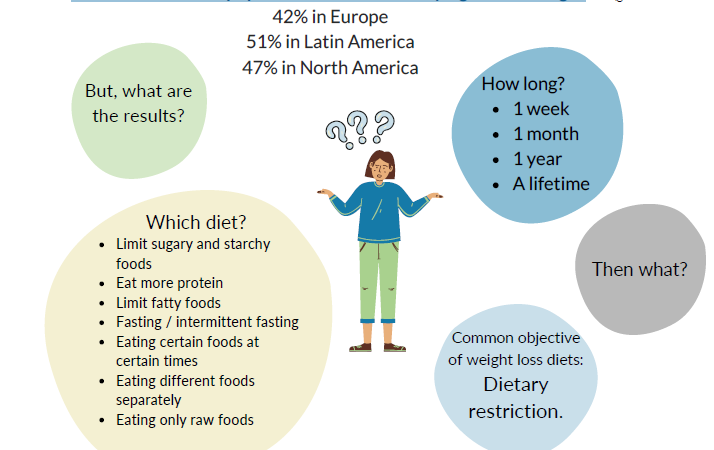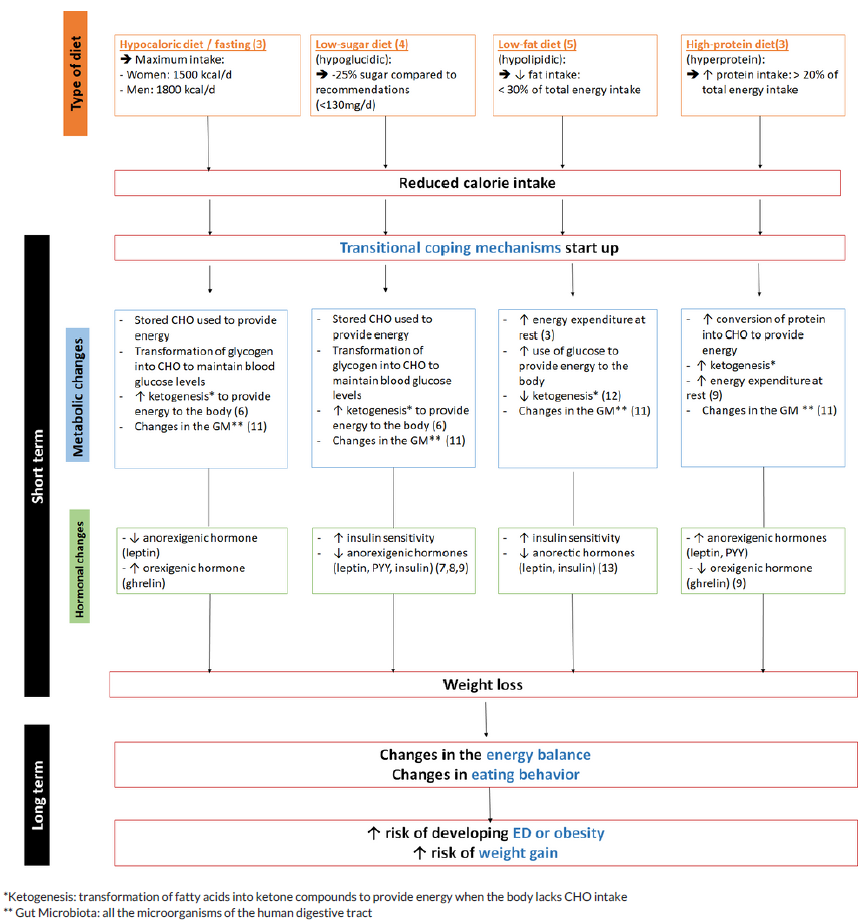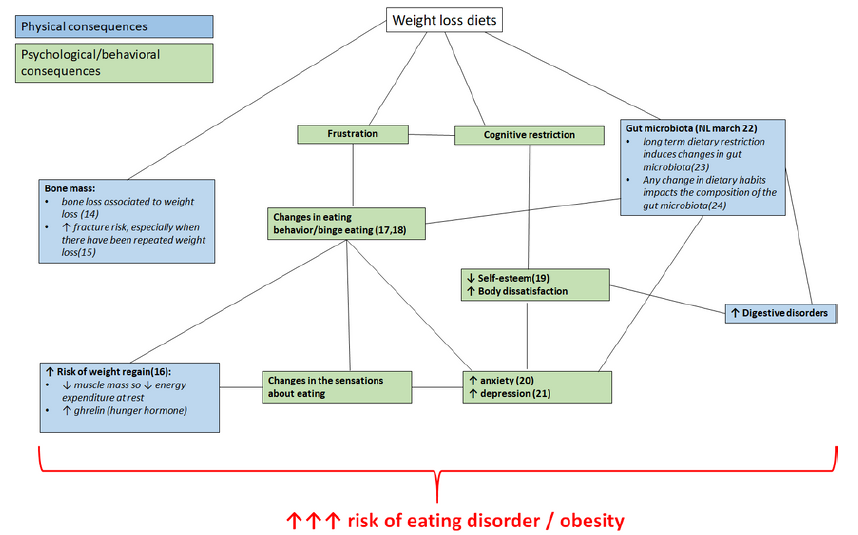Weight-Loss Diets
Source : Nutriactis/Rouen-Normandie hospital
Summary
- Statement on weight-loss diets
- Physiological effects of calorie restriction
- Never go on a diet ?

Nowadays, the question of weight, in particular of growing overweight and obesity is a pervasive public health issue at the international level. This explains the great interest of people in weight loss, notably via the numerous weight loss diets which exist today.
Countries’ nutritional policies for a healthy diet are guided by the recommendations of the World Health Organization (WHO). Henceforth, weight loss, depending on the method used to achieve it, may jeopardize people’s health. Not to mention the more than significant involvement of social standards regarding the “ideal body shape”.
In this article, you’ll find the physiological consequences of weight loss diets, and how they can have an impact on eating behaviors and weight.
Statement on weight-loss diets
Many reasons may motivate someone to undertake a weight loss diet:
- Medical reasons (overweight, obesity, articular problems, diabetes…)
- Social, family, and peer pressure to be slim
- Media pressure : the press, the media as well as social networks have an impact on the relationship with self-image and the relationship with food
45% of the world’s population in 2020 was trying to lose weight
(global advisor-2020)

Physiological effects of calorie restriction
Weight loss diets are intended to reduce one’s dietary intake, which leads to the appearance of transitional coping mechanisms (2). In fact, restriction of one or several nutrients (depending on the diet) leads to metabolic changes, i.e. a detour of the use of the remaining nutrients, and also changes in the quantity and sensibility (ability of the molecule to act) of the hormones associated with food intake. All these mechanisms vary depending on the individual and the severity of the diet.
In the short term, these changes can be reversed once the diet is stopped ; however if dieting continues, these modifications can be long-lasting and create a difficult-to-reverse alteration of eating behavior and of the hormonal regulation of food intake. There is then an increased risk of developing an eating disorder (ED) and/or obesity.

Consequences of calorie restriction

Weight loss diets can have several consequences on physical health, but also on psychological health. The intensity and impact of these consequences vary according to the individual but also according to the type of diet, its duration and severity.
- Any diet involves a change in dietary intake, whether it be in quality or in quantity. Yet, the scientific literature has widely highlighted the fact that all changes in diet induce an alteration in the gut microbiota, which may lead to changes in eating behavior as well as an increase in anxiety, depression, and digestive disorders. Furthermore, the implementation of a weight loss diet is usually accompanied by a strong cognitive restriction (voluntary reduction of food intake to lose weight). Yet, scientific studies have underlined the negative impact of cognitive restriction on self-esteem and body dissatisfaction, which in turn exacerbates the deterioration of mental health.
- The aim of weight loss diets is to reduce caloric intake to lose weight. Said restriction may easily lead to frustration which results in a strong increase of the risk of binge-eating episodes.
- Frustration, low self-esteem, and anxiety can induce a change in sensations about eating (26,27) resulting in an increased risk of weight regain, but also and most importantly, an increased risk of onset of ED / obesity.
Avoid weight-loss diets?
- In cases of overweight and obesity, losing weight may be necessary and beneficial for medical reasons.
- Nevertheless, after one year of dieting , there is a major risk of weight regain for 80% of people who have followed a weight loss diete pondérale à un an pour 80% des personnes ayant suivi un régime amaigrissant.
Before taking any action to lose weight, it is advisable to think about:  :
:
- The necessity of the weight loss process: is your weight within the standard? (18.5Who wants you to lose weight and why? You, your family and friends, your doctor ?
- Your eating habits: try eating mindfully by observing yourself (meal time, what you chose to eat, snacking…), eating slowly (take time to chew, put down your cutlery between each bite) and eating without distractions (being focused on sight, smell, taste). Taking time to fully enjoy what we eat helps regulate the quantities eaten, and our satisfaction.
- Eat according to your appetite sensations: paying attention to your appetite and satiety allows you to meet your energy and nutrient needs and thus better regulate your weight (26,27).
- Reconcile your relationship with food: A balanced and diversified diet assumes that all foods have a purpose. Weight is a question of balance between the calories that are ingested and the ones that are expended (your physical activity) .
- Physical activity (2) : practicing regular physical activity maintains muscle mass which helps stay in shape and guarantees the balance of body composition.
Conclusion
- Dieting to lose weight does not only impact your weight, but also and more importantly, your health ! The biological, behavioral and psychological impact of long-term weight-loss makes dieting risky for your health.
- Share your intentions with your doctor in order to be better accompanied if this weight loss is indeed necessary for your health.
-
Download this article in PDF form
pdf – 752 KB